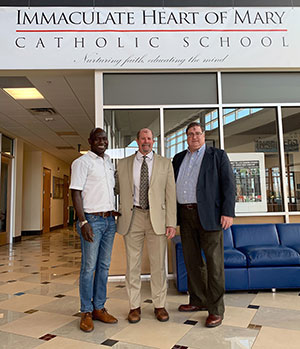 CHARLOTTE — Catholic Relief Services saved Thomas Awiapo from starvation. Once a poor orphan growing up in rural Ghana, now he travels around the United States every year during Lent sharing his story and thanking CRS supporters for the gift of a hot meal and schooling that they provide through the CRS Rice Bowl campaign.
CHARLOTTE — Catholic Relief Services saved Thomas Awiapo from starvation. Once a poor orphan growing up in rural Ghana, now he travels around the United States every year during Lent sharing his story and thanking CRS supporters for the gift of a hot meal and schooling that they provide through the CRS Rice Bowl campaign.
“I come here to share my story continuously because it touches minds and hearts in a way that moves people to act,” Awiapo explains. “It gives me the opportunity to put a face on the work of CRS around the world and to look people in the face to say thank you for their prayers and support.”
Awiapo visited Bishop McGuinness High School in Kernersville on Ash Wednesday, March 6. He attended Mass with the students and staff then gave a presentation to the whole school. He then traveled to Immaculate Heart of Mary School in High Point to share his message with them. He also visited St. Matthew School in Charlotte and the Diocese of Charlotte Pastoral Center on March 7.
“My story helps many Americans to appreciate the blessings in their lives and the call to share those blessings,” Awiapo says.
Awiapo and his three brothers were orphaned when he was just 10 years old.
“We cried for food, we went to bed hungry… Only sometimes at night we had a little dinner to share with all four of us.” He said that the amount of food for dinner was so little that they sat in a circle looking at it, thinking about how little amount of food it was.
“We would look at it and cry,” Awiapo says.
His two youngest brothers died of malnutrition – the youngest dying in his arms. “He was so skinny and bony. That has never left my mind,” he says.
His oldest brother fled, leaving him alone. He scrounged for food alone, doing odd jobs.
One day he smelled food being cooked at CRS’ St. Francis Xavier School in his village. The hot lunches and daily snacks were enough to attract him to attend school. He went on to graduate and earn scholarships to attend college in the United States.
“I was caught, joyfully caught, and I am glad that they did catch me. I am sitting here today with a master’s in public administration. The whole credit goes to Catholic Relief Services,” he notes.
Awiapo now works with CRS Ghana, teaching communities the value of good governance and the value of education. He often returns to his old school, which has been completely refurbished thanks to CRS.
He says that “the little snack” that CRS provided “tricked him into going to school” – and “this trick saved my life.”
 Catholic support for CRS, he says, “is just part of living our faith, creating a just world, changing lives of individuals, families and communities through our prayers and contributions. CRS offers Catholics the opportunity to live their faith in solidarity with the poor.”
Catholic support for CRS, he says, “is just part of living our faith, creating a just world, changing lives of individuals, families and communities through our prayers and contributions. CRS offers Catholics the opportunity to live their faith in solidarity with the poor.”
“It was wonderful to begin Lent this year listening to presentations by Thomas Awiapo,” says Joseph Purello, Catholic Charities’ director of social concerns and advocacy. “His story begins with one of survival in the face of misery and hardship, yet it becomes a compelling message of hope, faith, and gratitude that challenges his audience to encounter Christ at home in our families, and in each member of the whole human family.
“Almost 800 students in three of our diocesan schools heard his message of how Catholic Relief Services provided life-saving assistance, and how he now is able to do the same for children in Ghana. What a powerful witness to the Church’s ministry of caritas!”
To learn about CRS Rice Bowl and donate this Lent, go to www.crsricebowl.org.
— SueAnn Howell, senior reporter. Catholic Relief Services contributed.
RALEIGH — Bills introduced in the North Carolina General Assembly would broaden the state's power to investigate child sexual abuse crimes and raise the statute of limitations on claims of past abuse.
The proposals, labeled the Sexual Assault Fast reporting and Enforcement Child Act, or SAFE Child Act, gained early support from a Republican and Democrat lawmakers.
Several legislators appeared alongside child welfare advocates at a March 7 news conference in Raleigh led by North Carolina Attorney General Josh Stein.
"It doesn't matter whether you're a parent or a policymaker, nothing is more important than keeping children safe from sexual abuse," Stein said. "It's critical that we protect kids wherever they are or spend time, whether that's in their home or at summer camp or an afterschool activity or online."
With the proposed legislation, Stein said, "More children who were abused will see justice, and more abusers will see prison time."
Following Stein's news conference, the Diocese of Raleigh posted a statement on its website stating, "The Diocese of Raleigh looks forward to reviewing the proposed act recently announced by Attorney General Stein and supports efforts to further protect North Carolina's children from sexual abuse."
"Bishop (Luis) Zarama and the diocese support additional measures that would further clarify or expedite reports of suspected abuse and aid survivors in healing," the statement continued.
The legislation would extend the statute of limitations on misdemeanor child sexual abuse cases from two years after the alleged assault occurred to 10 years. Felony abuse cases already have no time limit on prosecution.
The statute of limitations on civil lawsuits related to claims of past child sexual abuse would extend to when the alleged victim reaches the age of 45 (in the House version) or age of 50 (in the Senate version). Under current law, the statute of limitations on civil lawsuits generally expires when the victim turns 21.
Noting that victims often don't come forward until years -- sometimes even decades -- later, Stein said, "We fully anticipate that more charges will be brought and more civil claims will be brought, because we know a great deal more about the psychological impact of abuse of children."
The proposed legislation would also empower the attorney general to convene an investigative grand jury to examine child sexual abuse claims -- a power currently not available in North Carolina.
The legislation would also mandate that all "high risk" sex offenders register their computer's IP address in addition to their physical address on the North Carolina sex offender registry.
Another provision would require any adult or institution that suspects child abuse to report it to local police -- not just to the North Carolina Department of Social Services as current law mandates. Failure to report abuse would be a misdemeanor.
Both the Charlotte and Raleigh dioceses already report all allegations of child sexual abuse to DSS as well as to the North Carolina Conference of District Attorneys, which then routes the report to the appropriate local law enforcement agency to investigate.
Since 2003, the Raleigh Diocese has trained more than 24,000 staff and volunteers in recognizing and reporting child abuse and neglect and have received national criminal background checks.
In the Diocese of Charlotte, more than 48,900 people have received training and nearly 57,000 background checks have been processed since 2002.
Reports of child abuse are declining in North Carolina – down 5.5 percent from 2013 to 2017, according to the latest data available from the Children’s Bureau of the U.S. Department of Health and Human Services. In 2017, 7,392 North Carolina children were victims of abuse or neglect, 19.5 percent of whom were sexually abused.
Deana Joy, executive director of Children’s Advocacy Centers of North Carolina, expressed support for Stein and the proposed legislation.
“We still have a long way to go to bring about drastic change in our state with regards to child abuse. It is our hope that this legislation, while a tremendous starting point, will more importantly begin a con-versation that will lead to streamlined centralization of reporting and statewide adult-based preven-tion efforts. There is nothing in our state that is more valuable than its children.”
— Patricia L. Guilfoyle, editor

